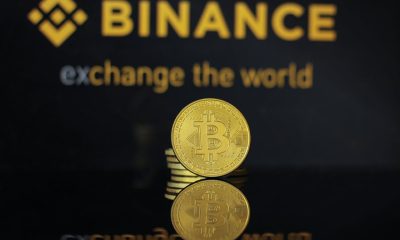Fintech
Naira Falls: Nigeria Accuses Binance and Stops Operations
Binance, the world’s largest centralized cryptocurrency exchange, discontinues services in Naira, Nigeria’s currency, amid accusations of money laundering. The services offered by Binance on the Naira are closed from March 8th, 2024. Nigeria’s central bank governor alleges $26 billion passed through Binance from unidentifiable sources, impacting Naira’s decline.

Binance, the largest centralized cryptocurrency exchange, has announced the cessation of its services in Naira, the local Nigerian currency.
This decision follows the various accusations made by the country’s leaders in recent days, notably presenting the platform as one of the main culprits for the current fall of this currency. A hard blow for the Nigerian cryptocurrency sector, already impacted by a major repression carried out by the current government.
Read more about the plummeting of Naira and the connection to Binance, and find the latest economic news from around the world with our companon app Born2Invest.
Binance allegedly influenced Naira exchange rates, says senior Nigerian official
A few months after seeing its former CEO Changpeng Zhao plead guilty to violating anti-money laundering laws in the United States, Binance is once again the subject of serious accusations.
This time, it is in Nigeria that the platform is encountering problems. Indeed, according to Olayemi Cardoso, governor of the central bank of Nigeria (CBN), cryptocurrency exchanges, particularly Binance, are vectors of money laundering.
To support his position, the latter asserts that approximately “26 billion dollars passed through Binance Nigeria from unidentifiable sources and users.” A situation which thus puts its entity in difficulty, because it is unable to regulate all crypto transactions carried out on Nigerian territory.
However, the problem is not only at this level. Indeed, for several months, the country’s economic system has been facing the daily fall of the Naira, the local currency. This year alone, Naira lost 40% of its value between January 29th and February 16th, according to data provided by Financial Afrik.
Over the same period, Naira’s value was 2,270 times lower than when it was created against the US dollar. Which constitutes a considerable decline, especially for the leading economic power in Africa.
Thus, faced with this situation, crypto exchanges have been considered as an alternative for Nigerians to protect their assets.
A question that officials raised, claiming that these same stock exchanges would have influenced exchange rates, thus accentuating the weakening of the Naira. As revealed by Bayo Onanuga , media advisor to President Bola Tinubu, this would be the main reason why the government opposed Binance.
The services offered by Binance on the Naira are closed from March 8th, 2024
With the numerous accusations that have been raised against it, the exchange platform led by Richard Teng has made an important decision. Indeed, in an email dedicated to its Nigerian users, the company announced that it would close all of its services based on the Naira from March 8, 2024.
All this while specifying that the latter can “continue to use services and products for other cryptocurrencies available” on the exchange. However, it should be noted that Binance has not exactly shown a passive stance since the start of this affair.
Two representatives of the company had also gone to Nigeria in the hope of discussing these various problems with the government. Which ultimately was not possible, because they would have been arrested upon their arrival according to Premium Times Nigeria. Facts that the Nigerian authorities have not yet confirmed at the time of writing these lines.
Remember, however, that a major crackdown has been carried out against crypto assets since the accession of Bola Tinubu to the presidency of the federal state in 2023.
A situation which worries several experts, who fear that it constitutes additional pressure on the current state of the country’s economy.
__
(Featured image by Sunday Abegunde via Unsplash)
DISCLAIMER: This article was written by a third party contributor and does not reflect the opinion of Born2Invest, its management, staff or its associates. Please review our disclaimer for more information.
This article may include forward-looking statements. These forward-looking statements generally are identified by the words “believe,” “project,” “estimate,” “become,” “plan,” “will,” and similar expressions. These forward-looking statements involve known and unknown risks as well as uncertainties, including those discussed in the following cautionary statements and elsewhere in this article and on this site. Although the Company may believe that its expectations are based on reasonable assumptions, the actual results that the Company may achieve may differ materially from any forward-looking statements, which reflect the opinions of the management of the Company only as of the date hereof. Additionally, please make sure to read these important disclosures.
First published in ActuFINANCE. A third-party contributor translated and adapted the article from the original. In case of discrepancy, the original will prevail.
Although we made reasonable efforts to provide accurate translations, some parts may be incorrect. Born2Invest assumes no responsibility for errors, omissions or ambiguities in the translations provided on this website. Any person or entity relying on translated content does so at their own risk. Born2Invest is not responsible for losses caused by such reliance on the accuracy or reliability of translated information. If you wish to report an error or inaccuracy in the translation, we encourage you to contact us

-

 Biotech6 days ago
Biotech6 days agoVytrus Biotech Marks Historic 2024 with Sustainability Milestones and 35% Revenue Growth
-

 Crowdfunding2 weeks ago
Crowdfunding2 weeks agoColombia Approves Terrenta’s Crowdfunding Platform for Real Estate Financing
-

 Crypto16 hours ago
Crypto16 hours agoRipple Launches EVM Sidechain to Boost XRP in DeFi
-

 Africa1 week ago
Africa1 week agoCôte d’Ivoire Unveils Ambitious Plan to Triple Oil Output and Double Gas Production by 2030
























